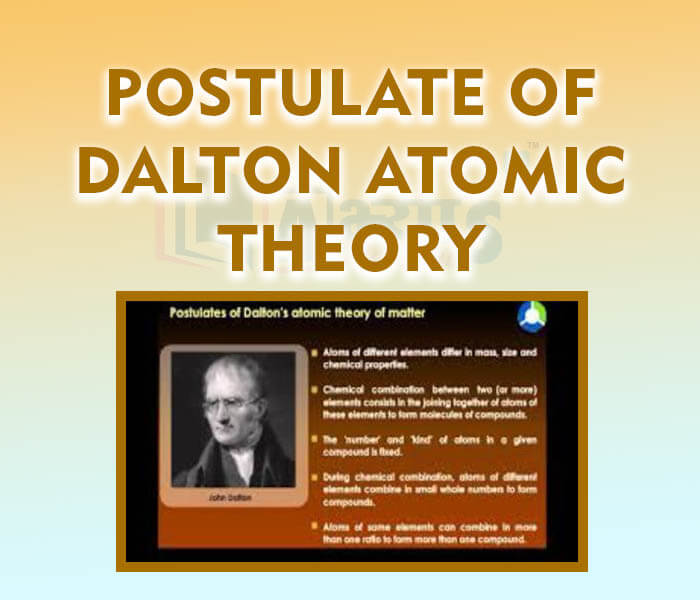Postulates of Dalton Atomic Theory










Postulates of Dalton Atomic Theory
Explanation of Laws of Chemical Combination: Dalton’s Atomic Theory:
Dalton’s atomic theory provided an explanation for the law of conservation of mass and the law of definite proportions. According to Dalton’s atomic theory, all matter (whether an element, a compound a mixture), is composed of small particles, called atoms.
The Main Postulates of Dalton’s Atomic Theory
1. Every matter is made up of very small particles, called the atoms.
2. Atoms are indivisible particles which can neither be created nor be destroyed in a chemical reaction.
3. Atoms of a given element are identical in mass as well as in chemical properties.
4. Atoms of different elements have different masses and chemical properties.
5. Atoms combine in the ratio of small whole numbers to form compounds.
6. The relative numbers and kinds of atoms are constant in a given compound.
Merits of Dalton’s Atomic Theory:
Demerits of Dalton’s Atomic Theory
Suppose we have three different elements X, Y, and Z. Which of the following statements can be true according to Dalton's atomic theory ? | |||
| Right Option : D | |||
| View Explanation | |||
Identify the Main Postulates of Dalton’s Atomic Theory (a) Every matter is made up of very small particles, called the atoms. (b) Atoms are indivisible particles which can be created and destroyed in a chemical reaction. (c) Atoms of a given element are identical in mass as well as in chemical properties. (d) Atoms of different elements have same masses and chemical properties. | |||
| Right Option : B | |||
| View Explanation | |||
Which among the following is not a postulate of Dalton Atomic Theory ? | |||
| Right Option : C | |||
| View Explanation | |||
Students / Parents Reviews [10]
About Abhyas metholodology the teachers are very nice and hardworking toward students.The Centre Head Mrs Anu Sethi is also a brilliant teacher.Abhyas has taught me how to overcome problems and has always taken my doubts and suppoeted me.

Shreya Shrivastava
8thAbhyas Methodology is very good. It is based on according to student and each child manages accordingly to its properly. Methodology has improved the abilities of students to shine them in future.

Manish Kumar
10thI have spent a wonderful time in Abhyas academy. It has made my reasoning more apt, English more stronger and Maths an interesting subject for me. It has given me a habbit of self studying

Yatharthi Sharma
10thAbhyas is a complete education Institute. Here extreme care is taken by teacher with the help of regular exam. Extra classes also conducted by the institute, if the student is weak.

Om Umang
10thMy experience with Abhyas is very good. I have learnt many things here like vedic maths and reasoning also. Teachers here first take our doubts and then there are assignments to verify our weak points.

Shivam Rana
7thIt has a great methodology. Students here can get analysis to their test quickly.We can learn easily through PPTs and the testing methods are good. We know that where we have to practice

Barkha Arora
10thOne of the best institutes to develope a child interest in studies.Provides SST and English knowledge also unlike other institutes. Teachers are co operative and friendly online tests andPPT develope practical knowledge also.

Aman Kumar Shrivastava
10thMy experience with Abhyas academy is very good. I did not think that my every subject coming here will be so strong. The main thing is that the online tests had made me learn here more things.

Hiya Gupta
8thBeing a parent, I saw my daughter improvement in her studies by seeing a good result in all day to day compititive exam TMO, NSO, IEO etc and as well as studies. I have got a fruitful result from my daughter.

Prisha Gupta
8thMy experience was very good with Abhyas academy. I am studying here from 6th class and I am satisfied by its results in my life. I improved a lot here ahead of school syllabus.
